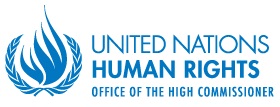Online Round Table “75 Years of the UN: Peace, Dignity and Equality on a Healthy Planet”
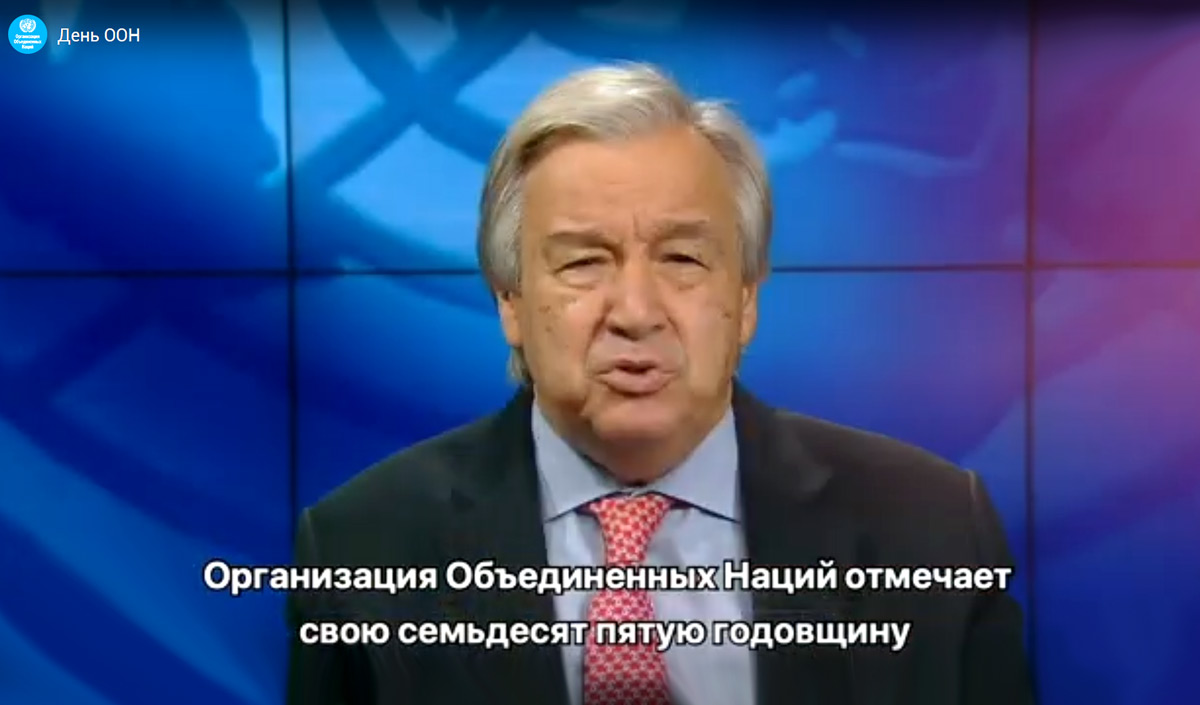
On 22 October 2020 the UN Information Centre in Moscow and the Centre for Documents of International Organizations of the Russian State Library – the UN Depository Library – held a round table “75 years of the UN: Peace, Dignity and Equality on a Healthy Planet” dedicated to the Day of the UN.
Our traditional round table was held online this year for the first time in connection with the pandemic. Still, it also had its advantages: we did not limit ourselves to the number of seats in the hall, but invited everyone to join the discussion.
The event was attended by representatives of UN agencies in Russia and our partners from leading Russian universities, such as MGIMO(U), MSLU, HSE, RUE of G.V. Plekhanov and RUDN University, as well as participants in the Master’s Program in Human Rights of the Consortium of Russian Universities, implemented with the support of the Office of the UN High Commissioner for Human Rights (OHCHR), from Yekaterinburg, Perm and Kazan.
The anniversary of the world organization is being held under the slogan “Common future through common efforts”. We have therefore gathered to discuss the role played by the UN in the life of the global community, the goals and objectives it faces, as well as the problems and challenges that we have to face.
We opened our round table with a video message from UN Secretary General Antonio Guterres on the occasion of the Day of the United Nations.
As well as a video recording of the speech of the President of the Russian Federation V.V. Putin at the 75th session of the UN General Assembly (excerpt from his speech).
Vladimir Valerievich Kuznetsov, Director of the UN Information Centre, addressed the participants of the round table with a welcoming speech, stressing that the United Nations celebrates its 75th anniversary at a difficult time – a time of severe trials and tremendous shocks for all of humanity associated with the pandemic and its economic and social consequences. The contribution of the world organization to the solution of global problems, including humanitarian ones, received deserved recognition in the year of its anniversary. The 2020 Nobel Peace Prize Laureate has been announced in Oslo. It was the United Nations World Food Program (WFP).
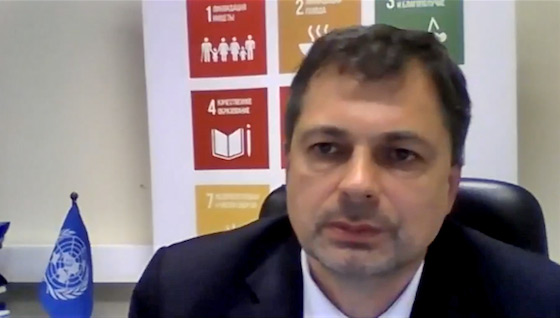
It was also noted that 2020 has become a year of global dialogue for the UN, when we came together to discuss the priorities of our united human family and ways to build a better future for all. During the anniversary year, surveys, dialogues, and discussions were conducted around the world, including online with millions of participants. However, the UN paid special attention to the position of youth. The results were amazing. Young people are set for big things – transforming the global economy, accelerating the transition to carbon-free technologies, universal health coverage, establishing basic income, and fighting racial injustice. They also want decisions to be made in a more open and inclusive manner. The youth supports ideas of global solidarity and reject isolationism.
The time has come, as we believe, to put these aspirations into practice. In the year of the 75th anniversary of the UN, same as in the 1945, we again found ourselves at a crossroads. We must make our choice and reaffirm our commitment to the principles enshrined in the Charter of the United Nations.
Our round table is dedicated to the 75th anniversary of the UN, but this is not the only anniversary, albeit on a global scale. The Director of the UN Information Centre congratulated our permanent partners on the anniversaries, who participate annually in the organization of this event and make their significant contribution to the dissemination of knowledge about the UN. This year marks the 90th anniversary of the Moscow State Linguistic University, the 55th anniversary of granting of the status of the UN depositary library to the Russian State Library and the 10th anniversary of the Centre for Documents of International Organizations of the RSL, as well as the 10th anniversary of the Department of International Complex Issues of Environmental Management and Ecology of MGIMO University of the Ministry of Foreign Affairs of the Russian Federation.
Maria Yevgenievna Yermakova Temporary Deputy Director General of the Russian State Library for External Relations and Exhibition Activities noted in her welcoming speech to the round table participants that it will be 55 years in 2020 since the Russian State Library was awarded the status of a UN depositary library. It was emphasized that the documents of the United Nations have been kept in the RSL since the foundation of the library in 1945. This is a great honour and a great responsibility. The library carefully stores about 500 thousand documents of the world organization.
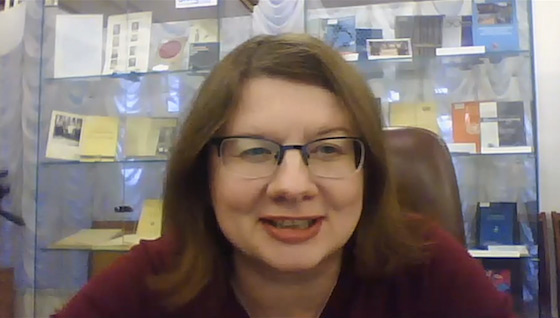
The library not only provides users with these documents, but also conducts numerous activities aimed at disseminating information about the UN. The “UN Days at the RSL”, which the library annually organizes together with the UN Information Centre at the RSL Centre for Documents of International Organizations are the most attractive for users and visitors of the RSL. These activities are complex in nature. This year they are held online for the first time.
Anastasia Andreyevna Klimenko, a librarian of the Department of Official and Regulatory Publications of the RSL has delivered a speech on the activities of the RSL – the UN Depository Library and the work of the Centre for Documents of International Organizations (CDMO). The RSL has for 55 years been organizing with the main purpose of popularizing and disseminating information and knowledge about the UN. It was emphasized that the UN fund, which is complex in structure and composition, has gone through a difficult path of formation, organization and placement in the system of the funds of the country's main library. All UN documents and publications are reflected in the catalogues of the RSL. In the anniversary year, the librarians of the Division began work on the presentation of UN information sources in the NEL – the Scientific Electronic Library.
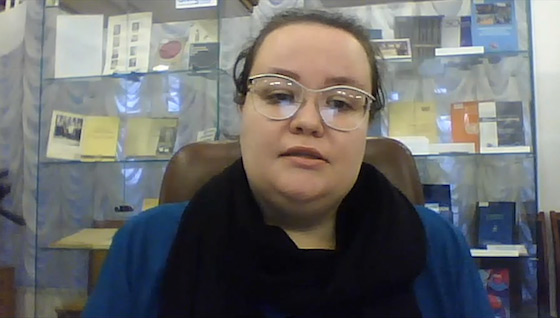
The Office of Official and Regulatory Publications became the main fund holder of the United Nations Depository Fund in the RSL in 1998. The findings from the study of readers’ requests for information about the UN allowed the Division (OFN) to initiate the creation of the Centre for Documents of International Organizations (CDIO) in 2010. The librarians of the Division have developed a new concept for the provision of information about the UN. It is based on the partnership and cooperation of the RSL with the UN Information Centre in Moscow, and representative offices of other UN agencies in Russia. The wide availability of UN publications is ensured by the active use of a modern technological platform. Approximately 90% of user requests are made through electronic resources.
Klimenko A.A. has presented presentation of the thematic exhibition to the participants of the round table, which was opened on the UN anniversary eve at the Centre for Documents of International Organizations – “75 years of the UN: the future we strive for, the UN that the world needs”. This exposition completes the cycle of thematic exhibitions dedicated to the anniversary of the world organization. Like the first two expositions – “75 years of the UN: a common future through common efforts” and “UN Day at the RSL”, the exhibition continues to tell the history and activities of the UN from the first years of its creation to the present.
Presentation on the exhibition can be found at this link.
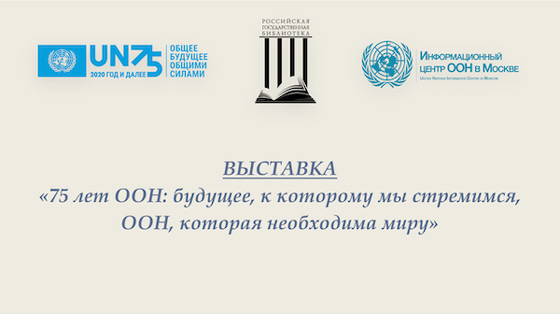
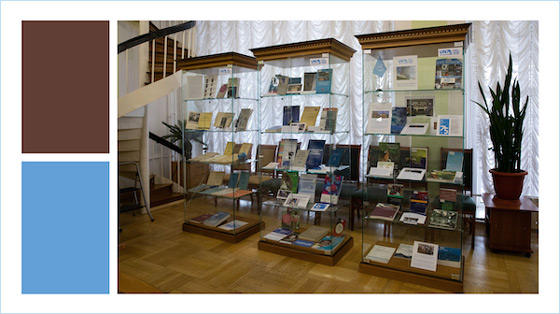
Respect for human rights is the cornerstone in the work of the United Nations. UN Secretary General António Guterres highlighted that “the COVID-19 pandemic is a public health emergency, but it goes far beyond that. This is an economic crisis. Social crisis. And a human crisis that is quickly turning into a human rights crisis”.
Rashid Aluash, Coordinator of the Joint Program of the Russian Federation and the Office of the UN High Commissioner for Human Rights spoke about the socio-economic challenges of our time against the backdrop of the COVID-19 pandemic. He noted that today extreme poverty, widespread inequality, and structural discrimination are among the greatest challenges of our time in every society and in all walks of life. To effectively combat them, measures based on human rights principles are necessary. Cooperation and participation are a need for everyone. Strong government policies are needed at all levels that consider the views and perspectives of the most vulnerable groups. If this was unclear before, then this has become obvious with the onset of the COVID-19 pandemic.
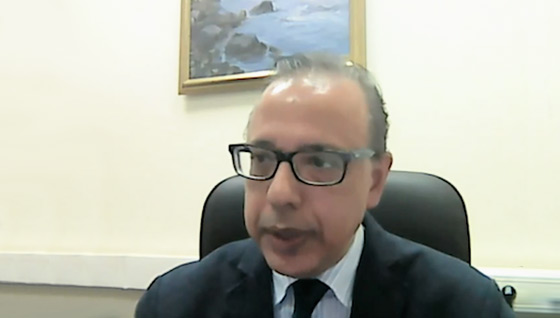
The speech also highlighted that COVID-19 has exposed systemic inequalities and structural discrimination that have been exacerbated by the pandemic and contributed to its onset. We have witnessed millions of people left without sources of livelihood, and at the same time we have seen an unprecedented increase in already impressive wealth among a small group of people. Vulnerable people, whose opinions were constantly neglected and whose interests were rarely considered, were the most affected by COVID-19, whether in terms of health or socio-economic consequences.
As the UN High Commissioner for Human Rights noted at the opening of the Social Forum, “We do not want and must not allow a return to the so-called normality that has made our society so vulnerable, fragile, unequal and unjust. Better-than-before recovery is about ending long-standing cycles of poverty and inequality. It also needs to strengthen our commitment to respecting all human rights and achieving the Sustainable Development Goals”.
Olga Vladimirovna Manukhina, noncommunicable diseases and communications Specialist of the Office of the World Health Organization in the Russian Federation told the roundtable participants about the role of communication strategies in the context of the COVID-19 pandemic.
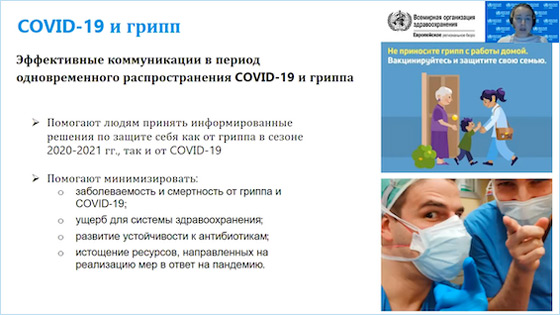
This year has made its own adjustments in connection with the pandemic, which affected each of us. It is now more evident than ever that effective communication is essential as a basic public health response to a pandemic, along with epidemiology, virology, and clinical case management. The higher the level of public confidence among the governmental authorities – health care included – the more willing will the people comply with health protection recommendations and take all precautions.
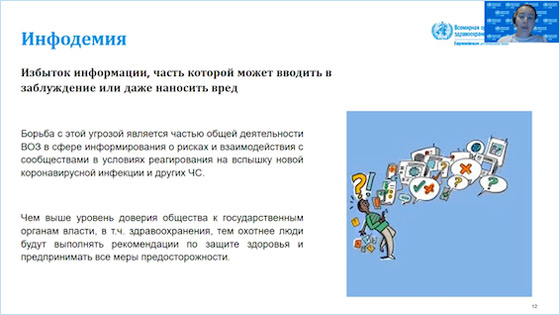
The pandemic is accompanied by “infomedia” throughout its development, that is, excessive amounts of information, some of which can be misleading or even harmful in terms of healthcare. And the WHO’s challenge, like other UN agencies, is to tackle this threat and provide clear, evidence-based and verified information that enables people to make the right decisions about their health and well-being.
Marina Nikolaevna Shirshova, Head of the Library of the UN Information Centre, acting as the moderator of the round table has noted, developing this important topic further, that from the first days of the COVID-19 pandemic, the Department of Global Communications (DGC) and its structures in different countries, including the UN Information Centre in Moscow are actively working to disseminate expert, reliable and up-to-date information on the Coronavirus infection, methods of prevention, treatment and measures taken by WHO and the UN in collaboration with national governments. Using its resources DGC thereby helps, above all the WHO, as an expert agency to significantly increase the coverage of audiences of different ages and social groups around the world.
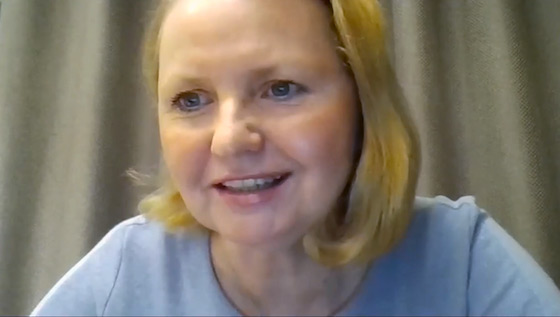
One striking example is the “Verified” global campaign, in which DGC called on people from different countries to become “information volunteers”. Their role is to register on the campaign’s website and share the verified information on how to protect themselves from Coronavirus infection, as well as on Facebook, Twitter pages, and other popular social networks. Every day, the “Verified” team provides digital rescuers with proven expert and fact-based information in an accessible form. Then this data is posted on social networks, which are read by relatives, friends and colleagues of the volunteers. Thus, the opportunity for informal communication and mobilization of a mass audience is to the maximum used.
Ekaterina Aleksandrovna Bliznetskaya, lecturer at the Department of International Complex Problems of Environmental Management and Ecology, Faculty of Applied Economics and Commerce, MGIMO(U) of the Ministry of Foreign Affairs of the Russian Federation, focused in her speech on international problems of environmental protection. The speaker, in particular, commented on the results of the global poll entitled “The future we want, the UN we need”, conducted by the UN within its 75th anniversary year. Almost a million people from all over the world took part in this survey. The purpose of the survey was to find out people's opinions on priority measures for recovery from the pandemic, global trends that will affect the common future, as well as to assess people’s attitude towards the UN itself.
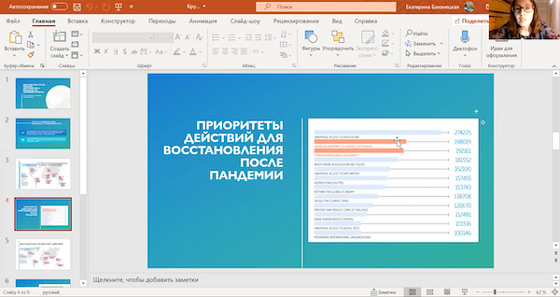
The first priority in recovery from a pandemic, according to most respondents around the world, is to improve access to basic services: health care, safe water and sanitation, as well as education. With regard to long-term priorities, it was unanimously considered that climate change and environmental degradation would have the greatest impact on the future of humankind. At the same time, the survey showed that the UN still has a significant credit of trust: almost three quarters of respondents believe that the UN is a leading organization helping to address the key challenges the world faces today.
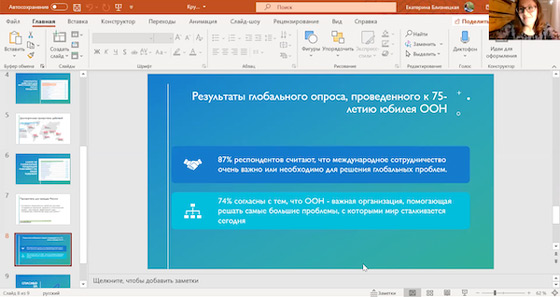
Svetlana Nikolaevna Smirnova, Head of the Department of Legal Education and Interaction with Scientific and Educational Organizations of the Organizational and Analytical Department of the Office of the Ombudsman in the Russian Federation, summed up the results of the All-Russian competition of scientific student works (essays) “Russia and the UN: 75 years of partnership”.
As part of the celebration of the 75th anniversary of the establishment of the United Nations, the Ombudswoman in the Russian Federation Tatyana Moskalkova held the All-Russian competition of student scientific papers (essays) “Russia and the UN: 75 years of partnership”.
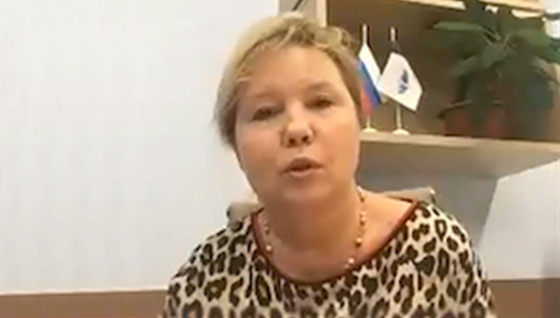
The competition was co-organized by the Consortium of Universities of the Russian Federation, which is implementing a joint master’s program in human rights with the support of the Office of the United Nations High Commissioner for Human Rights and the European Inter-University Centre for Human Rights and Democratization. Partnership support was provided by the Office of the United Nations High Commissioner for Human Rights. The UN Information Centre acted as the information partner of the competition. The competition was aimed at developing students’ interest in topical issues of protecting human rights and dignity of the individual, developing legal culture and legal consciousness of young people, forming civic responsibility and active citizenship, increasing creativity and stimulating scientific research activities, studying Russian and international experience in the field protection of human and civil rights and freedoms.
The results of the competition can be found here.
Summing up, the moderator of the round table Marina Nikolaevna Shirshova noted that the period of forced self-isolation opened for us all new opportunities for communication and interaction, emphasized the importance of modern technologies and social networks. The world after COVID-19 will certainly not be the same, and the UN will also change, which is already demonstrating its flexibility and ability to quickly adapt to new circumstances.
In these conditions, the only possible way is seen in strengthening the collective principles of international cooperation. The UN is the cornerstone of such a system and a unique platform for coordination of common actions of states. It is necessary to unite efforts in order to firmly protect lofty ideals enshrined in the UN Charter, which in fact are universal human values, the meaning of which is that no one in the world “is left behind”.
The UN serves as “the hope and home for all humanity”. It faces a lot of tasks, and we believe that it will remain om top of the situation.
The round table ended with a video showing of the UN School Festival dedicated to the 75th anniversary of the UN. The curator of the Festival is the United Nations Association of Russia.










